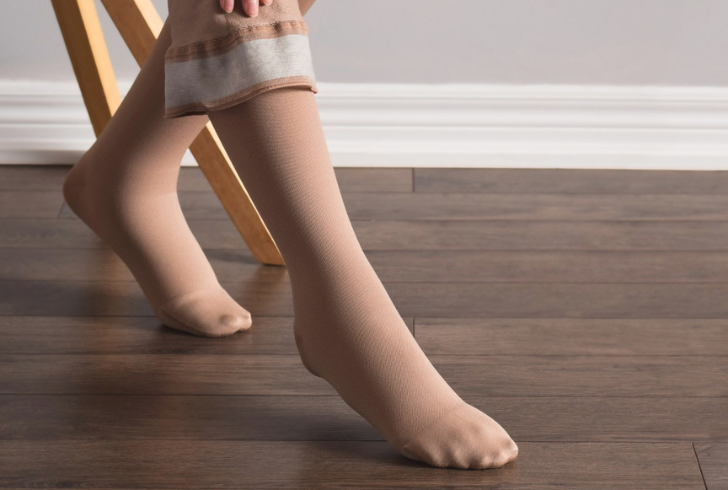For many of us, our legs take a beating throughout the day. Whether you’re pounding the pavement as a runner, chained to a desk for eight hours, or expecting a little bundle of joy, healthy blood flow is crucial for leg health. Compression socks have become increasingly popular for their purported benefits in reducing swelling, preventing blood clots, and minimizing aches and pains. But with so much information swirling around, a common question arises: should you sleep in compression socks?
Let’s delve into the fascinating world of compression socks, exploring their benefits, potential drawbacks, and whether nighttime wear can truly enhance your leg health.
Understanding Compression Stockings

Compression stockings, or compression socks, are specialized garments designed to exert gentle pressure on the legs, aiding in blood circulation. These socks, available in various lengths and compression levels, work by applying graduated pressure, tightest at the ankle and gradually decreasing as they ascend the leg.
The primary goal? To facilitate blood flow from the feet back to the heart, reducing swelling, discomfort, and the risk of circulatory issues like DVT. They’re a versatile accessory, catering to athletes, individuals recovering from surgery, pregnant women, frequent travelers, and those with mobility challenges.
Benefits of Compression Socks
Wearing compression socks isn’t just about managing existing conditions; it’s also about optimizing wellness. These snug garments offer an array of benefits:
- Enhanced Circulation: By promoting blood flow, compression socks help deliver oxygen-rich blood to muscles, aiding in performance and recovery.
- Reduced Swelling: Whether it’s from prolonged sitting, standing, or medical conditions like lymphedema, compression socks can alleviate swelling in the legs, ankles, and feet.
- Improved Recovery: Athletes swear by compression socks for faster post-exercise recovery, minimizing muscle soreness and cramping.
- Clot Prevention: By preventing blood from pooling in the legs, compression socks reduce the risk of dangerous blood clots like DVT.
Who Should Use Compression Stockings?

Compression stockings cater to a diverse range of individuals, including:
- Those at risk of circulatory issues like DVT or varicose veins
- Individuals recovering from surgery or managing lymphedema
- Athletes seeking performance enhancement and faster recovery
- Pregnant women experiencing swelling and discomfort
- Travelers facing long periods of inactivity on flights or road trips
Should You Sleep in Compression Socks?
Now, let’s address the burning question: should you sleep in compression socks? While opinions vary, here’s what you need to consider:
The Case For:
- Enhanced Overnight Recovery: Some believe that wearing compression socks to bed can aid in overnight muscle recovery, particularly for athletes and active individuals.
- Minimized Morning Swelling: Wearing compression socks while sleeping may help reduce morning swelling, offering a more comfortable start to the day.
- Maintained Circulation: By preventing blood from pooling during the night, compression socks could promote healthier circulation, especially for those prone to leg discomfort or circulatory issues.
The Case Against:
- Risk of Discomfort: For some, wearing compression socks while sleeping may feel restrictive or uncomfortable, potentially disrupting sleep quality.
- Skin Irritation: Prolonged wear, especially during sleep, could lead to skin irritation or sensitivity, particularly if the socks are ill-fitting.
- Potential Circulatory Issues: There’s a concern that wearing compression socks overnight could impede natural circulation, leading to adverse effects in some individuals.
Tips for Safe and Comfortable Compression Sock Use

If you’re considering wearing compression socks to bed, here are some tips to ensure a safe and comfortable experience:
- Choose the Right Compression Level: Opt for a compression level that meets your specific needs and conditions, ensuring optimal comfort and effectiveness.
- Ensure Proper Fit: Invest in properly fitted compression socks to avoid discomfort or circulation issues. Consider professional fitting services for prescription-grade stockings.
- Practice Proper Care: Regularly wash your compression socks to maintain cleanliness and elasticity, enhancing their longevity and effectiveness.
- Listen to Your Body: Pay attention to any signs of discomfort, irritation, or circulation issues while wearing compression socks, especially during sleep. If problems arise, discontinue use and seek medical advice.
Listen to Your Body and Consult Your Doctor
Ultimately, the decision of should you sleep in compression socks depends on individual needs and health situation. If you’re experiencing leg discomfort, swelling, or have concerns about blood circulation, consult your doctor. They can assess your specific situation and advise you on the best course of action, including whether nighttime compression sock wear could be beneficial.
Remember, compression socks are a tool, not a magic bullet. While they offer a range of potential benefits, they should be used in conjunction with healthy lifestyle practices like regular exercise, maintaining a healthy weight, and staying hydrated.




